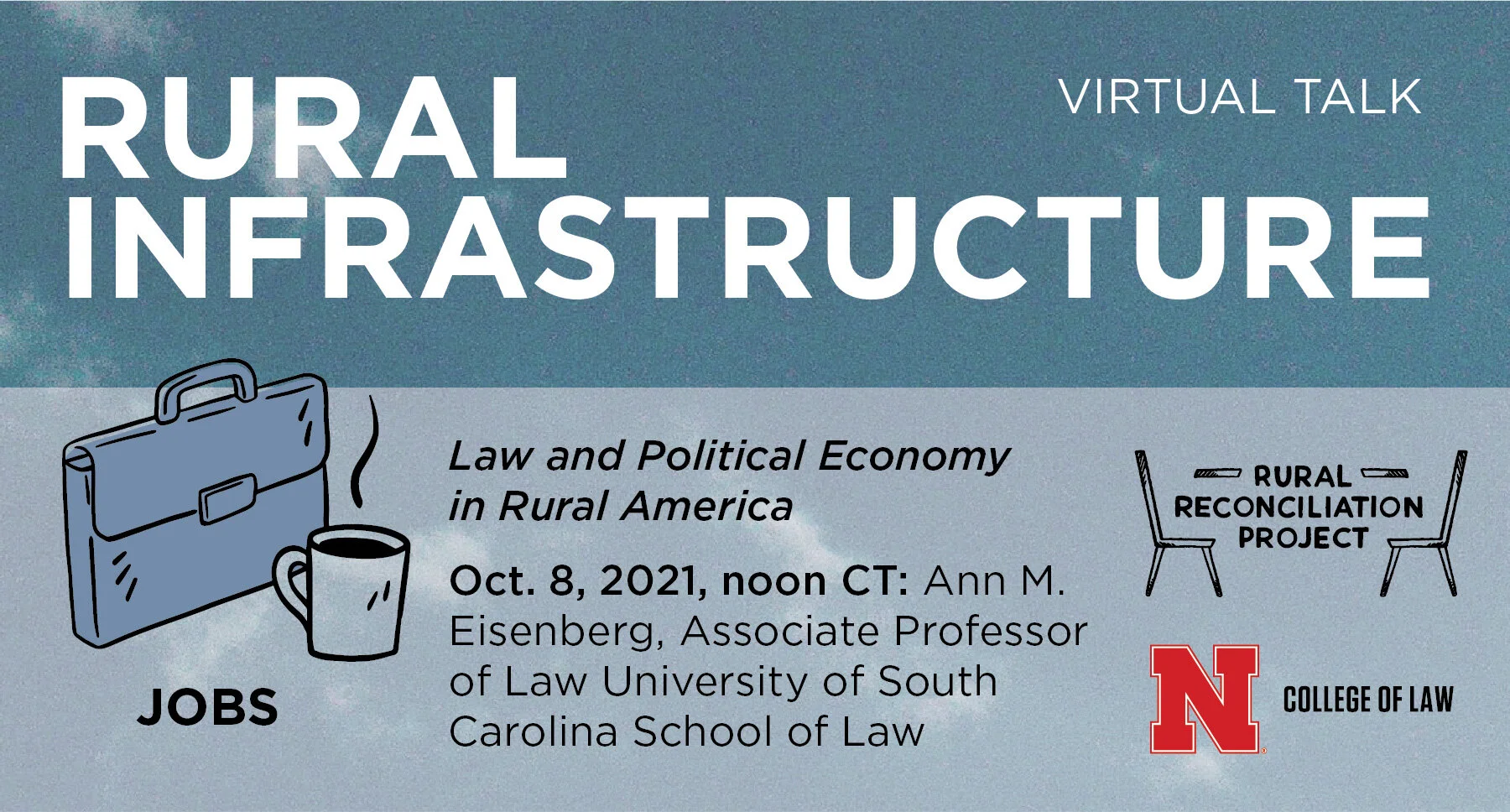Event Summary: Ann Eisenberg on Rural Jobs (10.8.21)
Professor Ann Eisenberg kicked off our 2021-2022 Rural Reconciliation Project program series on RURAL INFRASTRUCTURE with a focus on JOBS. A full recording of her talk, Law and Political Economy in Rural America, can be viewed here.
On this page, Karsen Sims, a wonderful second-year law student at the University of Nebraska College of Law and esteemed Project research assistant (find her bio in the student contributor section here), provides the following event summary, from her perspective.
On Friday, October 8th, 2021, Professor Ann Eisenberg (South Carolina School of Law) kicked off the Rural Reconciliation Project’s Rural Infrastructure Research Series with a discussion on “Jobs.” Eisenberg’s discussion built on her prior articles, including Distributive Justice and Rural America and Economic Regulation and Rural America. One of Professor Eisenberg’s primary points was that jobs, employment, regional vitality, and infrastructure are all very much legitimate questions of law and policy. Rural jobs, infrastructure, and regional economies are not born in a vacuum and are not products of benign markets that function without human involvement.
Rather than seeing these trajectories as natural and inevitable, Professor Eisenberg has asked how the law shapes rural economic opportunity? To address this question, Eisenberg challenged the typical narrative that rural life is just declining, dying, or being forgotten naturally. She asked: What harmed rural communities? Who forgot them? And who left them behind? To answer these questions, Eisenberg researched three of the major rural economic sectors – agriculture, coal mining, and manufacturing – and analyzed the laws shaping them through the lens of distributive justice.
This research led Eisenberg to conclude that, in many ways, policymakers have made the conscious decision to undermine rural communities for the sake of a perceived wider good. Eisenberg guided the audience through historical and contemporary actions that she asserted demonstrated these kinds of trade-offs. For example, Eisenberg explored how law and public institutions (1) helped trade small farms for consolidated industrialized ones in the name of progress, (2) facilitated coal communities’ exploitation and neglect by actively supporting coal extraction and then failing to address coal’s decline in the name of the greater good in the transition to clean energy, and (3) helped trade company towns and plant jobs for globalized trade to chase the aggregate benefit of economic growth and consumer access. To put it bluntly, Eisenberg suggests these rural communities and their livelihoods were sacrificed. This argument directly contradicts the “forces of nature” narrative that some use to explain rural decline.
Eisenberg ended her discussion with a more hopeful outlook for the potential of rural revitalization. She discussed how current legislation, including the federal response to the COVID-19 pandemic, has also taken broad strides to try and tackle some of the infrastructure necessary for rural revitalization. Eisenberg discussed how billions of dollars have been put toward rural health care, broadband, food access, agricultural support, and Native American community development and support.
She believes America is in a potentially hopeful moment with movement toward acknowledging the need to take action in rural communities to offset, counteract, and reverse some of the more questionable policies of the past.
The audience was engaged with all of Eisenberg’s research and enjoyed a thoughtful discussion. Questions ranged from rural voting patterns and political rhetorical framing to antitrust issues to personal experiences in Midwestern cheese factories and wondering if “jobs” is broad enough measure to address the transitions rural Americans have faced.
There is much more to talk about in terms of rural infrastructure, and we look forward to continuing the conversation next with a talk by Professor Alexandra Klass from the University of Minnesota Law School on the role of rural energy cooperatives in green energy transitions.
